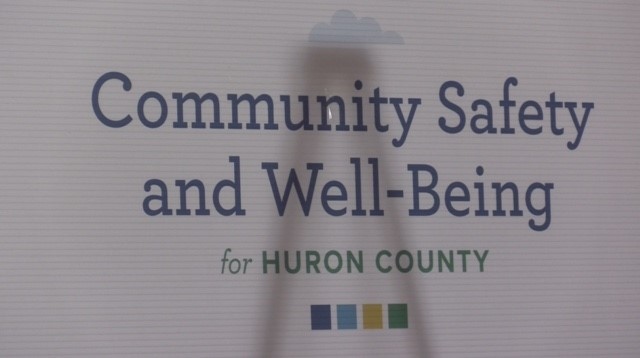'It is an epidemic': Gender based violence rising in Huron County
Intimate partner violence is more than a daily occurrence in Huron County.
“It is an epidemic. It’s increased by 68 per cent in Ontario since 2020,” explained Corey Allison, executive director of the Huron Women’s Shelter, Second Stage Housing, and Counselling Services.
In Huron County, OPP report 765 occurrences related to intimate partner violence in 2023. That’s a steady increase from the 415 such calls in 2010.
“Our number one callout is intimate partner violence. Domestic or sexual assault are number one and number two for our callouts. Number three is tragic circumstances like fires and car crashes,” said Deborah Logue, executive director of Victim Services of Huron County.
Women in rural Ontario are two-and-a-half times more likely at risk of dying due gender based violence than their urban counterparts.
“My best guess is it’s related to isolation. The lack of anonymity and the lack of resources available in rural Ontario,” explained Allison.
Openly discussing the epidemic of intimate partner violence is the focus of the latest campaign from Huron County’s Community Safety and Well-Being Working Group. It’s a provincially mandated plan to try and shine a light on the social issues impacting and/or harming local residents, including children.
“Whether it’s something they are seeing or hearing, or are just aware of, they are experiencing that violence as a very real and direct threat to their own survival, just by proximity to their parent at risk,” said Katrina Clarke, member of the Community Safety and Well-Being Working Group, and executive director of Rural Response for Healthy Children.
 A sign for the Community Safety and Well-Being Working Group in Goderich, Ont. (Scott Miller/CTV News London)
A sign for the Community Safety and Well-Being Working Group in Goderich, Ont. (Scott Miller/CTV News London)
While the campaign messaging being distributed by every municipality in Huron County features a woman with a black eye, Logue said gender based violence doesn’t always mean physical harm is being inflicted.
“There’s emotional, financial, there’s threats to children or even pets. All of the behind the scenes forms of control are a big factor of intimate partner violence. It doesn’t need to take a bruise on your face to reach out for help. Get to us before that,” explained Logue.
The Community Safety and Well-Being Group’s campaign will not only feature public messaging, but free online training for anyone that wants to recognize the risks and signs of intimate partner violence in their family, neighbourhood and community.
Bringing the organizations together that deal with the growing epidemic has also launched the creation of a high risk response team in Huron County, so that contacting any social agency for help brings together all potential groups and individuals that have the skills and resources to assist.
“We could come together in a matter of a day and put together an intervention that could save lives. That is actively being created in our community,” said Allison.
In 2023, 62 women were killed by men in Ontario. That is a 59 per cent increase in femicide in the province since 2019.
If you are in need of help dealing with intimate partner violence you can reach out to Huron Women’s Shelter, Second Stage Housing, and Counselling Services or Victim Services of Huron County. If it is an emergency, call 911.
CTVNews.ca Top Stories

Canadian musician Jacob Hoggard found not guilty of sexual assault
Canadian musician Jacob Hoggard has been found not guilty of sexually assaulting a young woman in northeastern Ontario eight years ago. The former Hedley frontman had pleaded not guilty to sexual assault.
Police arrest Toronto woman in connection with three recent homicides
Police have arrested a Toronto woman in connection with three recent homicides and investigators say that they believe two of the victims may have been 'randomly targeted.'
Missing B.C. climber died from fall on Mount Baker, medical examiner says
The body of a British Columbia mountain climber has been located and recovered after the 39-year-old man was reported missing during a solo climb on Washington state's Mount Baker earlier this week.
Following child's death in Ontario, here's what you need to know about rabies and bats
An Ontario child died last month after coming into contact with a rabid bat in their bedroom, which was the first known human rabies case in Canada since 2019.
A French judge in a shocking rape case allows the public to see some of the video evidence
A French judge in the trial of dozens of men accused of raping an unconscious woman whose now former husband had repeatedly drugged her so that he and others could assault her decided on Friday to allow the public to see some of the video recordings of the alleged rapes.
Former Colorado county clerk Tina Peters sentenced to 9 years for voting data scheme
A judge ripped into a Colorado county clerk for her crimes and lies before sentencing her Thursday to nine years behind bars for a data-breach scheme spawned from the rampant false claims about voting machine fraud in the 2020 presidential race.
Anne Hathaway confirms 'Princess Diaries 3': 'Miracles happen'
You might be thinking, 'Shut up!' but it’s officially true: the 'Princess Diaries' franchise is finally growing.
Youth pleads guilty to manslaughter in death of P.E.I. teen Tyson MacDonald
A teen charged with the murder of another teen on Prince Edward Island last year has pleaded guilty to a lesser charge of manslaughter.
Sask. man pleads guilty in U.S. after unknowingly providing videos of men raping toddlers to FBI agent
A Saskatchewan man living in the United States has pleaded guilty to possessing child pornography after he unknowingly provided disturbing videos to an FBI agent he thought was a pedophile.

































